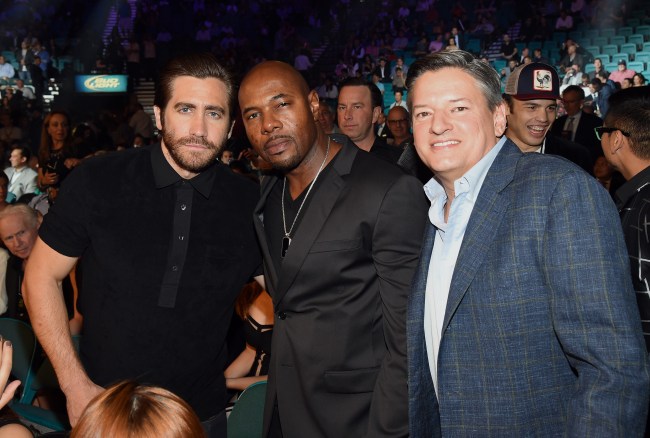
Netflix Chief Content Officer Ted Sarandos (right) ringside at Mayweather-Pacquiao
It’s common wisdom at this point that television networks largely depend on live sports to survive the rise of subscription-based streaming services like Netflix and Hulu. That’s why they pay ludicrous sums of money to sports leagues for broadcast rights. It’s also why lots of people wonder if Netflix, spender of ludicrous sums of money, will ever throw its hat into the ring.
Now, a recent Business Insider article has raised the threat level from “never gonna happen” to, in Netflix Chief Content Officer Ted Sarandos’ own words, “never say never.” Speaking at a media research conference, Sarandos expanded upon his sentiment:
“I will never say never, but I would say that where we sit today I don’t think the on-demandness to sports is enough of an addition to the value proposition to change,” Sarandos said, according to a webcast of the event. “I think the leagues have tremendous leverage in those deals, so it’s not like we’re going to get in and de-leverage the leagues.”
Sarandos is 100 percent right about how much leverage sports leagues currently have. Netflix is still in a gray area in terms of profitability (see: spending ludicrous sums of money), so the prospect of going toe-to-toe with ESPN (and their parent company, Disney) has to make their investors blanch. His comment about “on-demandness” is a little strange, and not just because it’s loathsome, Silicon Valley-style word pudding. Sure, the binge-watching appeal of Netflix doesn’t translate to sports, but broadcast rights don’t just apply to live games.
There’s a reason why ESPN largely ignores hockey in favor of basketball in its coverage — it’s because they don’t have broadcast rights, so instead of paying NBC for their coverage to use in highlights packages, they mostly pretend it doesn’t exist (of course, they also do so to devalue hockey in the national conversation and assert the dominance of the sports they cover, but still). Netflix almost certainly could get creative in using the archives of footage it builds up. Even though it’s years down the road (at best), it’s an intriguing thought.
(Via Business Insider)






